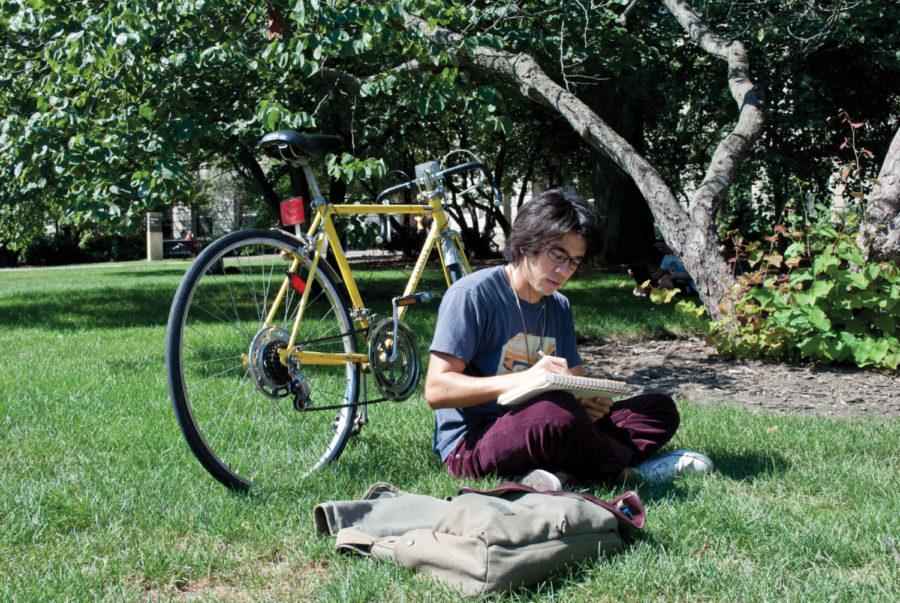Witte: Reading for leisure important to expansion of horizons
Brandon Persson, junior in architecture, enjoys a book and sketching outside of Parks Library on Monday.
August 30, 2011
Do you like to read? This may have been a silly question decades ago, but unfortunately it is a legitimate query in the times we live in. Reading has become somewhat of a chore to many college students this day and age. It’s something that is only done in dire circumstances, when cramming for a test or hastily catching up before class starts. Many professors water down the course reading load to accommodate students that despise reading or are simply too lazy to put forth the effort.
Suddenly it has become a badge of honor to admit you hate reading. And this is not even the type of reading I am getting at. I mean reading. You know, for leisure? Reading books that stimulate your mind or take you to different lands; that kind of reading.
In today’s mass saturation with pop culture, cellphones, social media and a near endless stream of entertainment, Americans today are relentlessly bombarded with attention-grabbing distractions: reality television, contests, sports, celebrity gossip, clubs and parties, booze and sex. It is of no wonder that many people do not do any actual reading anymore. Who wants to expand their mind reading philosophy when you can spend an entire day glued to a television screen watching “Jersey Shore”?
If you have never read Ray Bradbury’s “Fahrenheit 451,” I highly recommend that you do so. The book is set in a futuristic, dystopian American society where no one reads books because they are burned by fire departments. Although this can be seen as a criticism of government censorship, it is not. The people themselves stopped reading books because mass entertainment provided them instant gratification. Books also made people unhappy because they show different sides and viewpoints to “conventional wisdom.” At one point, the fire chief explains, “If you don’t want a man unhappy politically, don’t give him two sides to a question to worry him; give him one. Better yet, give him none. Let him forget that there is such a thing as war.”
Taking people’s minds off of what is important depoliticizes them and keeps them from considering alternatives.
Bradbury’s almost prophetic vision of the future is complete with parlor rooms in which three of the four walls are covered entirely with television screens. People go off in the morning to work and drive back home so they can be mindlessly entertained by television shows that send out scripts to the viewers so that, as they follow along, the actors stare into the camera and wait for you to give your line, making you think that the show cannot possibly go on without you. The mindset of doing something incredibly important, yet in reality is completely pointless, ensues (American Idol text-in voting, anyone?). Although, I digress.
There is a clear upshot to this seeming epidemic, however. It is never too late to change. Go to the Parks Library to find anything you fancy, whether it be fiction, science fiction, romance or fantasy. You name it, they have it. There are myriad of ways you can start reading great books. Lists upon lists of classics you can pick up are available on the Internet, or you could just peruse the library and seek out books that pique your interest.
Also, if you do have a smartphone or tablet, chances are there is a free e-reading app you can download that contains a plethora of free classic titles. The possibilities are nearly endless.
So what is to be done about the current and future state of reading in this country? We can either continue to let it slide until Ray Bradbury’s tale comes to fruition, or we can pick up an intriguing title and welcome the company of a society that chooses to read. The choice is up to you.

















